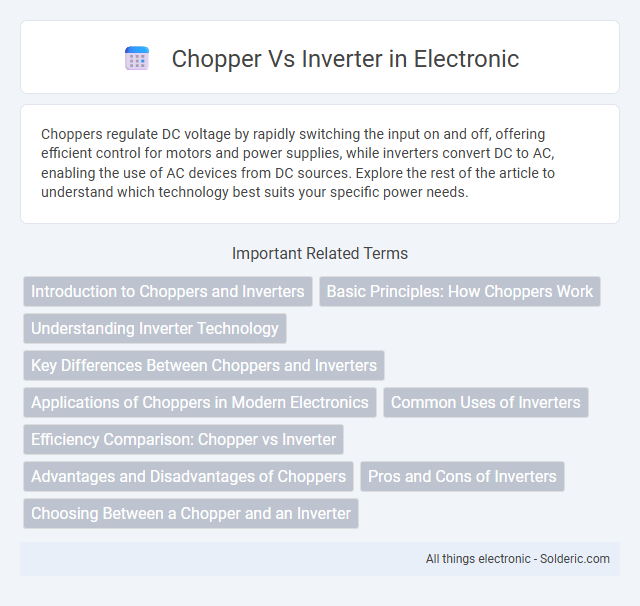Choppers regulate DC voltage by rapidly switching the input on and off, offering efficient control for motors and power supplies, while inverters convert DC to AC, enabling the use of AC devices from DC sources. Explore the rest of the article to understand which technology best suits your specific power needs.
Comparison Table
| Feature | Chopper | Inverter |
|---|---|---|
| Function | DC to DC voltage conversion | DC to AC voltage conversion |
| Output Type | Variable DC voltage | AC voltage (variable frequency & amplitude) |
| Application | DC motor speed control, battery voltage regulation | AC motor drives, renewable energy systems, UPS |
| Switching Device | Transistors, MOSFETs, IGBTs | IGBTs, MOSFETs |
| Control | PWM for voltage regulation | Pulse Width Modulation (PWM) for waveform shaping |
| Energy Efficiency | High efficiency due to minimal energy loss | High efficiency with advanced modulation techniques |
| Complexity | Simple circuit design | More complex due to AC waveform synthesis |
| Output Frequency | Not applicable (DC output) | Adjustable frequency for motor speed control |
Introduction to Choppers and Inverters
Choppers are DC-DC converters that regulate voltage by rapidly switching a DC input to produce variable DC output, commonly used in electric vehicles and motor control applications. Inverters convert DC power into AC power, enabling compatibility with AC loads and grid integration in renewable energy systems and uninterruptible power supplies (UPS). Both devices rely on semiconductor switches like IGBTs and MOSFETs, employing PWM techniques for efficient power conversion and control.
Basic Principles: How Choppers Work
Choppers are DC-DC converters that regulate voltage by rapidly switching the input supply ON and OFF, controlling the average output voltage through pulse-width modulation (PWM). The basic principle involves chopping the input voltage into pulses of varying widths, which when filtered, produce a desired DC output level. This switching action enables efficient voltage regulation with minimal power loss compared to linear methods.
Understanding Inverter Technology
Inverter technology uses high-frequency switching to convert direct current (DC) into alternating current (AC) with variable output voltage and frequency, enabling precise control of motor speed and energy efficiency in electrical devices. Unlike chopper circuits that adjust voltage by rapidly switching DC voltage on and off, inverters provide smoother sine wave output, reducing harmonic distortion and improving performance in applications such as air conditioners, refrigerators, and variable-speed drives. Advanced inverter systems incorporate pulse-width modulation (PWM) techniques and microcontroller-based algorithms to optimize power conversion and minimize energy losses.
Key Differences Between Choppers and Inverters
Choppers control DC voltage by rapidly switching it on and off to regulate power levels, while inverters convert DC voltage into AC voltage for applications requiring alternating current. Choppers primarily operate with DC circuits and manage voltage magnitude, whereas inverters focus on producing AC waveforms with adjustable frequency and amplitude. Efficiency, waveform output, and application domain distinguish these power electronic devices, with choppers used in DC motor drives and inverters essential in renewable energy systems and AC motor control.
Applications of Choppers in Modern Electronics
Choppers are extensively used in modern electronics for applications requiring efficient DC voltage control, such as electric vehicle motor drives and renewable energy systems like solar power converters. Their ability to rapidly switch and regulate voltage levels with minimal power loss makes them ideal for battery-operated devices and industrial automation. Choppers also find applications in switched-mode power supplies and DC motor speed control where precise voltage regulation is crucial.
Common Uses of Inverters
Inverters are widely used in renewable energy systems such as solar and wind power installations to convert DC electricity into usable AC electricity for homes and businesses. They are essential in uninterruptible power supplies (UPS) and electric vehicles, providing reliable energy conversion and efficient power management. Additionally, inverters play a critical role in motor drives and HVAC systems by enabling precise control of AC motor speed and torque.
Efficiency Comparison: Chopper vs Inverter
In efficiency comparison, inverters generally outperform choppers due to their ability to provide smoother and more precise control of output voltage and current, minimizing energy losses. Choppers, while simpler and cost-effective for DC voltage regulation, tend to have higher switching losses and limited control over harmonic distortion. Your choice depends on whether maximum energy efficiency or cost-effective voltage control is the priority in your application.
Advantages and Disadvantages of Choppers
Choppers offer high efficiency in converting DC power by rapidly switching between on and off states, making them suitable for variable voltage control in electric vehicles and industrial drives. Their advantages include simplicity, reduced power loss, and fast response times, but disadvantages involve voltage ripple, limited frequency range, and the need for complex control circuits. Understanding these trade-offs helps optimize your power electronics system design for specific applications.
Pros and Cons of Inverters
Inverters offer efficient energy conversion with smoother voltage output, making them ideal for sensitive electronic devices. They produce less noise and heat compared to choppers, enhancing durability and operational stability. However, inverters tend to have higher initial costs and complexity in design, which can impact maintenance and integration in some applications.
Choosing Between a Chopper and an Inverter
Choosing between a chopper and an inverter depends primarily on the type of load and power conversion requirements. Choppers are ideal for DC motor speed control and applications requiring variable voltage output with high efficiency. Your choice should consider the direction of power flow, voltage type needed, and the complexity of the control system.
Chopper vs Inverter Infographic

 solderic.com
solderic.com